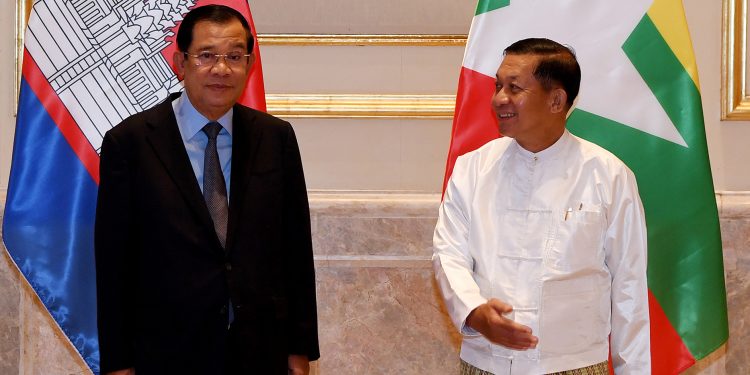From the start, Cambodia’s tenure as chair of the Association of Southeast Asian Nations (ASEAN) has been a time of dismay for Myanmar, with Phnom Penh never failing to find some new way to disappoint the people of the country. Even as it prepares to hand off to its successor, it is still finding ways to frustrate them. Take its latest announcement on Myanmar on Wednesday.
In his capacity as the ASEAN chairman, Cambodian Prime Minister Hun Sen said in the statement that the bloc was gravely concerned over the recent escalation of violence in Myanmar, including armed clashes in Karen State and a deadly air strike on a civilian gathering in Kachin State.
But the statement shamefully avoids naming the perpetrator: the Myanmar military regime, which is responsible for air raids that killed at least 50 people, including civilians, in Kachin as well as deadly air strikes and shelling in Karen State. Both happened late last week.
Rather than directly name the culprit, the statement just says that ASEAN urgently calls on all parties concerned, “in particular one with significant power on the ground,” to take its repeated and worn-out suggestion to “take concrete actions to enable a process of inclusiveness and constructive dialogue and to seek a peaceful solution and national reconciliation in Myanmar and for the sake of peace, security and stability in the region.”
Former US ambassador to Myanmar Scot Marciel tweeted “It serves no purpose other than to make one look feckless” to refuse to name an offending country or organization while making it 100 percent clear to whom you are referring.
Yes, ASEAN under Cambodia’s chairmanship has proved to be feckless from the beginning.
Hun Sen’s legacy is to have been the first international premier to visit Myanmar and hold talks with the junta leadership, while almost the entire world shunned them for seizing power from the democratically elected government and for its bloody post-coup crackdowns on peaceful protesters.
Furthermore, with the upcoming handover of the chairmanship to Indonesia, Hun Sen’s fantasy of becoming a negotiator between the junta and ASEAN has now fizzled out. He dreamed of coaxing regime chief Min Aung Hlaing into implementing the bloc’s Five Point Consensus peace plan for Myanmar. He barked at his critics: “Please do not bother me; give me time [to meet the leader of Myanmar].”
Sadly for him, the junta’s stubbornness doomed his dream. He also personally appealed to Min Aung Hlaing not to hang four democracy activists, but to no avail. His special envoy has flown to Myanmar twice, but neither visit yielded significant results. Their deals with the regime on the provision of humanitarian assistance to the country were much criticized for giving the junta control over distribution.
After all his repeated missteps, the failure to name the Myanmar junta as the culprit in the statement Wednesday suggests Hun Sen still hasn’t come to his senses about the regime he has been dealing with throughout his chairmanship.
Myanmar will remain a thorn in ASEAN’s side after Indonesia assumes the chairmanship. The new chair shouldn’t follow in Cambodia’s footsteps. ASEAN as a whole should now reform its approach to Myanmar, as the Five-Point Consensus the bloc adopted for the country has yet to bear fruit more than one year on. It’s time to think outside the consensus.
Equally important, ASEAN must not legitimize the junta’s actions, such as by officially recognizing the regime’s planned election next year. Member states should also refrain from applying double standards on Myanmar issues. In particular, neighboring countries to Myanmar who are members of ASEAN should consider the impacts of living next door to such a politically and socially unstable country. They will be the ones who suffer the destabilization first and most immediately—some are already struggling with it—before the whole region experiences the detrimental effects.

















